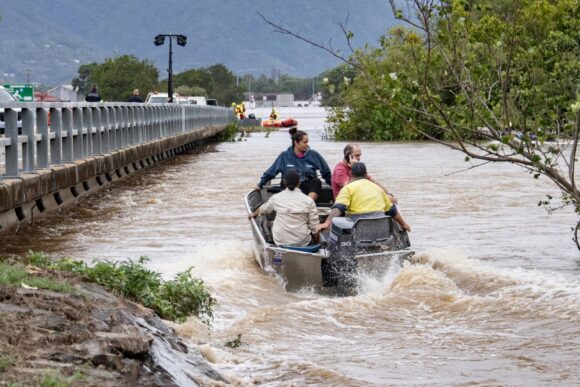Major investors in Australia aren’t responding fast enough to rising threats to infrastructure and other assets from cyclones, floods and other natural disasters, according to a group focused on climate risks.
Extreme weather events in the nation in recent years have impacted everything from airports and farms to power grids and mines — all assets targeted by money managers seeking long-term returns for workers and retirees.
Even so, a survey of 63 investors operating in Australia with more than A$35 trillion ($23 trillion) under management globally found only 16% had calculated the risk across their entire portfolio. Just 3% were taking any action, the Sydney-based Investor Group on Climate Change found in its study.
“There’s been a real focus on recovery as opposed to adaptation and resilience,” said Kate Simmonds, physical risk advisor at the group, which represents a network of institutional investors. “That’s going to need to change.”
Australia’s lethal 2019–2020 bushfires destroyed thousands of homes and caused an estimated A$8 billion in damage. Floods in eastern Australia in early 2022 racked up A$6 billion of insured losses, according to the Insurance Council of Australia. The economic costs from increasingly volatile weather will reach hundreds of billions of dollars in coming decades, the IGCC said. These climatic changes “are already unavoidable,” it said.
Climate Vulnerability
The risks aren’t lost on Aware Super, a A$175 billion Australian pension fund with a portfolio that includes a large wind farm, hospitals, transport hubs and ports. The fund adopted a traffic-light system to model different climate scenarios and assess the vulnerability of assets to events like floods and extreme heat, Chief Investment Officer Damian Graham said in an interview.
“We believe there’s a real risk, and if we get it right, it’ll add returns in time,” Graham said. Assets that have successfully limited the chances of damage will fetch higher prices when it’s time to sell, he said. Aware Super’s modeling didn’t suggest any assets need to be sold immediately, Graham said.
According to the IGCC, investors should be assessing risk under at least three plausible situations, including 1.5C (2.7F) of warming and another for at least 3C. Planned disclosure laws in Australia will probably compel entities to report the implications of different scenarios, the group said. In the survey, just 32% of respondents said they had carried out such analysis.
“Action on adaptation and resilience must significantly increase to safeguard the value of investments,” the IGCC said in its report.
Photograph: Residents cross floodwaters by boat in Cairns, Australia on Dec. 18, 2023; Photo credit: Brian Cassey/AFP/Getty Images
Topics Australia
Was this article valuable?
Here are more articles you may enjoy.



 AIG’s Zaffino: Outcomes From AI Use Went From ‘Aspirational’ to ‘Beyond Expectations’
AIG’s Zaffino: Outcomes From AI Use Went From ‘Aspirational’ to ‘Beyond Expectations’  Experian Launches Insurance Marketplace App on ChatGPT
Experian Launches Insurance Marketplace App on ChatGPT  Insurance Issue Leaves Some Players Off World Baseball Classic Rosters
Insurance Issue Leaves Some Players Off World Baseball Classic Rosters  ‘Structural Shift’ Occurring in California Surplus Lines
‘Structural Shift’ Occurring in California Surplus Lines 

